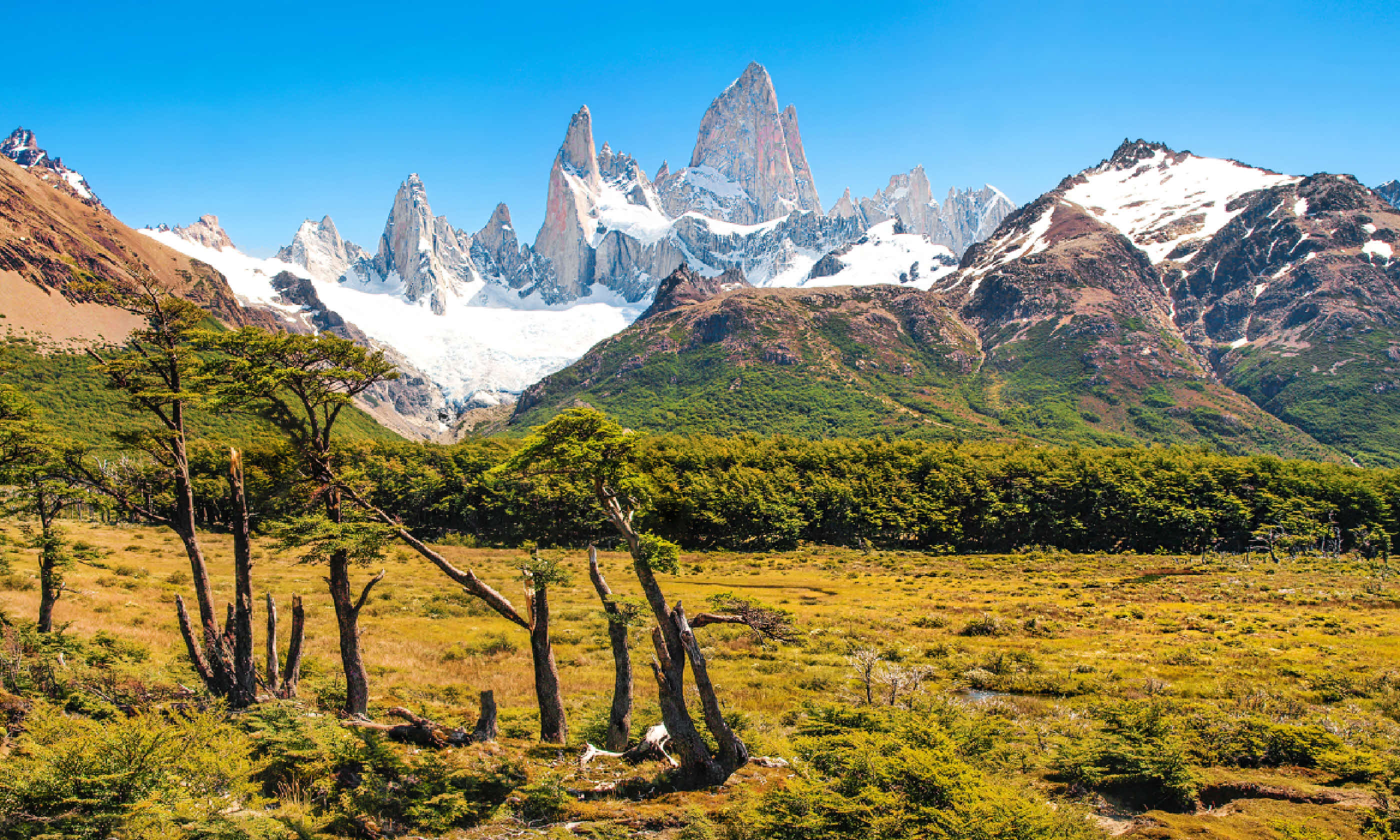
South America's 12 best walks (that aren't the Inca Trail)
Inca history, alien landscapes and little-trodden trails: South America offers hikers epic experiences of glaciers, rainforests and volcanoes… often all in one route
1. Huchuy Qosqo Trek, Peru
Where? Sacred Valley
Length: 17km
Days: 1-2
Difficulty: Easy; some climbs very gentle by Andean standards
No time, permits or inclination to follow the infamous Inca Trail, but still fancy a leg-stretch while you’re in the area? A hike to the little-known site of Huchuy Qosqo (‘Little Cusco’) offers plenty of Inca intrigue – those trademark stone steps, impressive ruins, a breathy pass, a dramatic canyon – minus the crowds and commitment associated with the lionised hike.
The two-day route from Tambomachay to Lamay follows parts of Inca pathways that once connected Cusco to Pisac. En route you’ll pass old tumbling terraces and grazing llamas and alpacas, and you’ll gain views down to lakes and up to snow peaks such as sacred Salkantay. After a night camping out in the mountains, a squeeze through the narrow Leon Punku ravine leads to the one-time administrative centre of Huchuy Qosqo, its hall, houses and recently restored granary sitting atop a 3,450m-high plateau, far from the madding crowds.
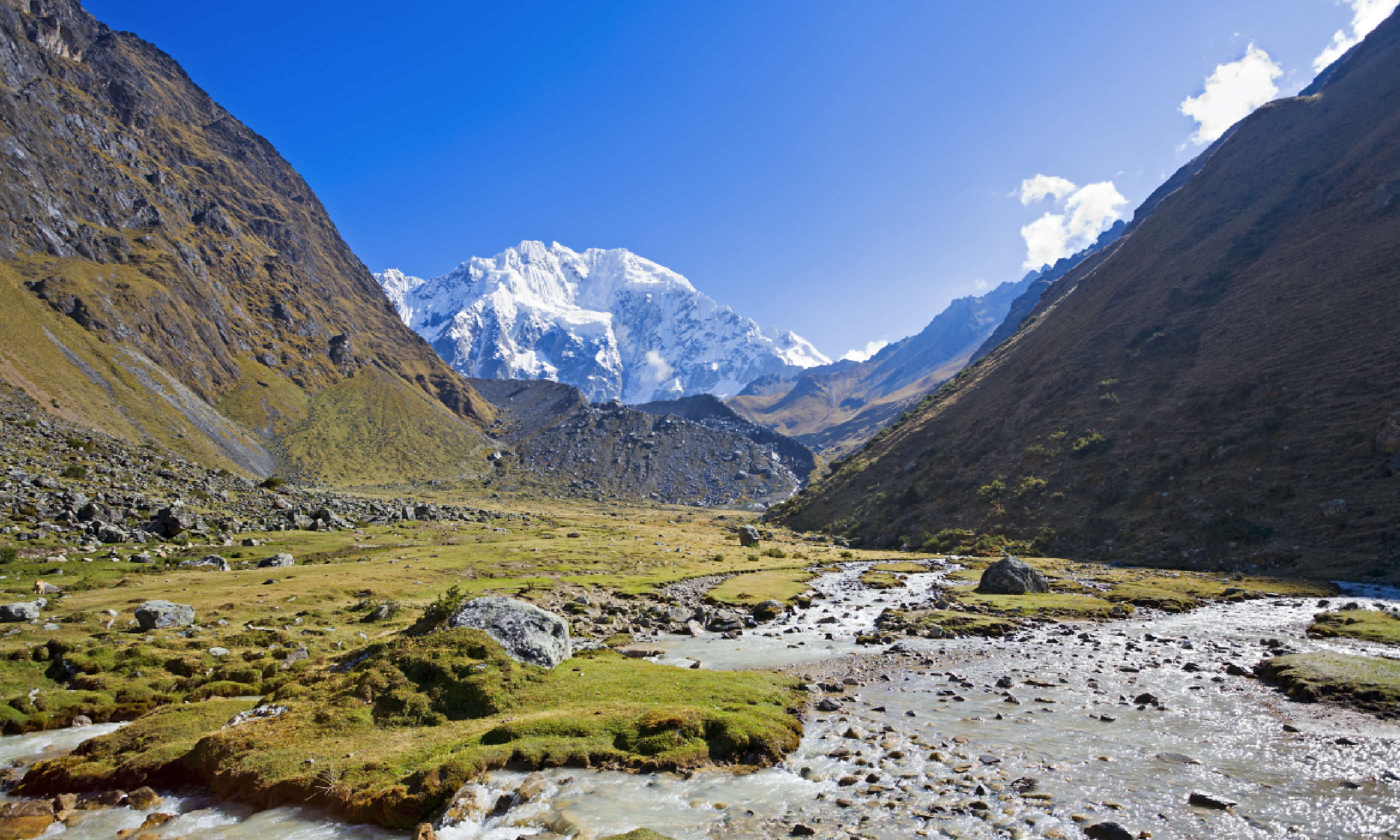 Salkantay (Shutterstock)
More info:
Salkantay (Shutterstock)
More info: Many Cusco-based tour companies offer this hike, including transfers. It can be shortened to a day-walk by starting from the village of Patabamba instead of Tambomachay.
Like that? Try this... A three-day Lares Valley Trek: there are various possible routes here – all are far less frequented than the classic Inca Trail, and don’t require permits, but encompass traditional villages and magnificent mountain scenery.
Walking the Lares Trek, Peru | Try a 'community trek' from the village of Lares
First 24 hours in Cusco, Peru | Cusco is breathtaking in every sense
2. Isla del Sol Traverse, Bolivia
Where? Lake Titicaca
Length: 15km
Days: 1 (5-6hrs)
Difficulty: Easy, if acclimatised; short, but high altitude
There are no cars, or even roads, on this island adrift in the world’s highest commercially navigable lake – just 5,000 residents, a few donkeys and some wonderful rocky walking trails. There are plenty of tourists, too, but you can escape many of them by making a long loop walk, and staying overnight – most see Sol as a day-trip destination.
Hiking the coast path from Yumani, in the south, to Challapampa, in the north, then returning via the upper path, will take you via terraced fields and pre- Columbian ruins, with views over the ethereal lake to the snow-capped Andes. Sol is also home to Puma Rock, reputedly the birthplace of Manco Capac, founder of the Incas. The walk, though not long, is literally breathtaking – the island sits at around 3,800m – so acclimatise first before making your traverse.
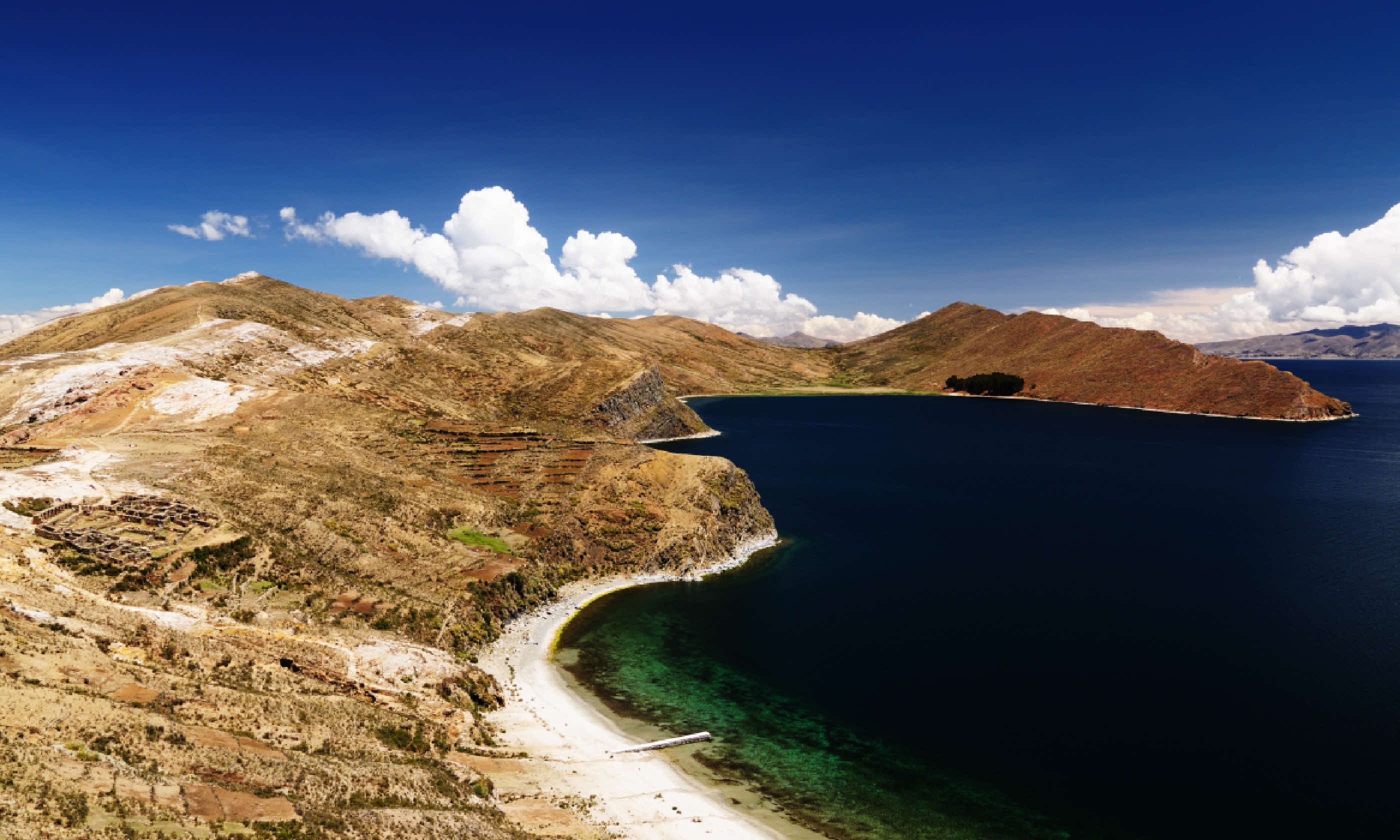 Isla del Sol on Titicaca lake
More info:
Isla del Sol on Titicaca lake
More info: Boats run from Copacabana to Yumani (1.5hrs) and Challapampa (2hrs). Permits are required to visit the different sections of the island; carry change to buy them from local toll booths (and beware scammers).
Like that? Try this... The 70km Choro Trail winds downhill from near La Cumbre, following a pre-Hispanic path through the richly biodiverse cloudforest of Bolivia’s Cotapata NP.
5 reasons to get friendly with Bolivia | Is Bolivia really the 'world's unfriendliest country'?
Bolivia's best landscapes | Breathtaking views and experiences
3. Fitz Roy Loop, Argentina
Where? Los Glaciares National Park
Length: 35km
Days: 2
Difficulty: Easy-Moderate
Mount Fitz Roy is classic Patagonia – a jagged, utterly inhospitable-looking spire, piercing a landscape of groaning glaciers and wild, wind-whipped valleys. But, if you get lucky with the weather, there are few more jaw-dropping places to hike.
A rewarding two-dayer heads from near El Chaltén to Laguna de los Tres – for fine views of 3,405m Fitz – and on to Laguna Torre, with a night camping lakeside in between. Pause at the Piedras Blancas Glacier lookout, dig deep for the climb to Laguna de los Tres and camp by Laguna Capri; the next day, wake early to see – hopefully – the mountains daubed sunrise-pink, then continue via the Torre Valley to the lagoon, where bergs float and peaks glower.
Fortunately, while Mount Torre has a reputation as being one of the world’s toughest climbs, this hike is a far more manageable endeavour.
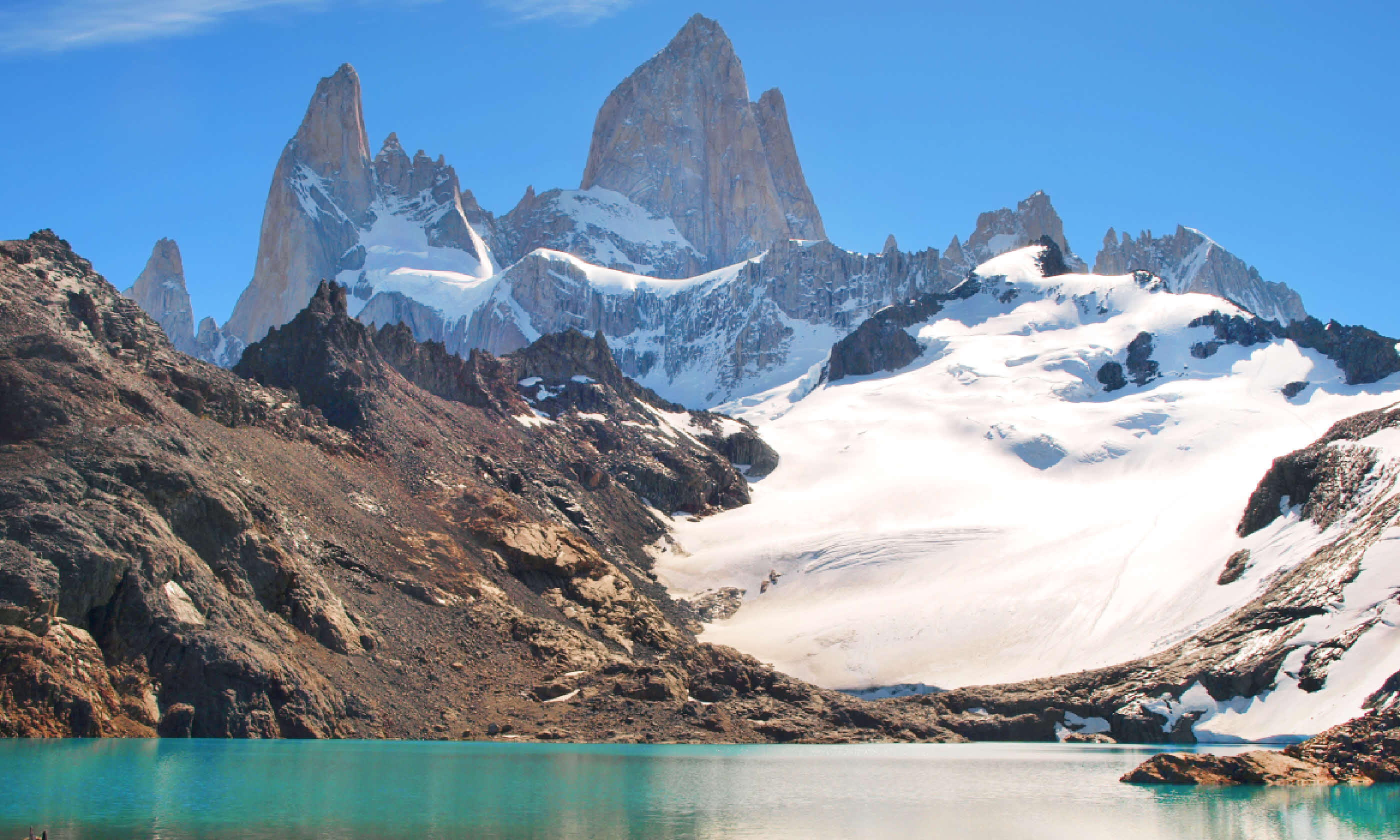 Mt Fitz Roy and Laguna de Los Tres in Los Glaciares National Park (Shutterstock)
More info:
Mt Fitz Roy and Laguna de Los Tres in Los Glaciares National Park (Shutterstock)
More info: El Chaltén, the region’s hiking hub, is a 3hr drive from El Calafate, which has an airport; buses serve the route.
Like that? Try this... Tackle a longer, more challenging Fitz Roy Circuit, around the massif, which involves hiking right across the region’s glaciers.
Road trip Patagonia | Welcome to Argentina’s wildest highway
The Wanderlust guide to the best of Argentina | All you need to know before you go
4. Quilotoa Traverse, Ecuador
Where? Central Sierra
Length: 35km
Days: 2-3
Difficulty: Easy-Moderate; make it easier by shortening hiking days – villages are around 15km apart
The 200km Quilotoa Loop road links Andean villages and volcanically-sculpted countryside in remote central Ecuador. It also provides access to numerous trailheads for self-guided hikes.
The trek between Quilotoa village itself and the town of Sigchos, with an overnight stop in Chugchilan and/or Isinlivi en route, offers some of the best scenery, sights and detour options, including forays down the Río Toachi Canyon, a visit to a hill fortress and even a tasting at a cheese factory. Time your walk right to hit local markets too: Sigchos on a Sunday; Guantualó on a Monday.
There’s more uphill involved if you walk Sigchos-Quilotoa rather than vice versa, but by doing the former you end at Quilotoa Crater Lake, a striking bowl of blue amid the mountains – a worthy finish.
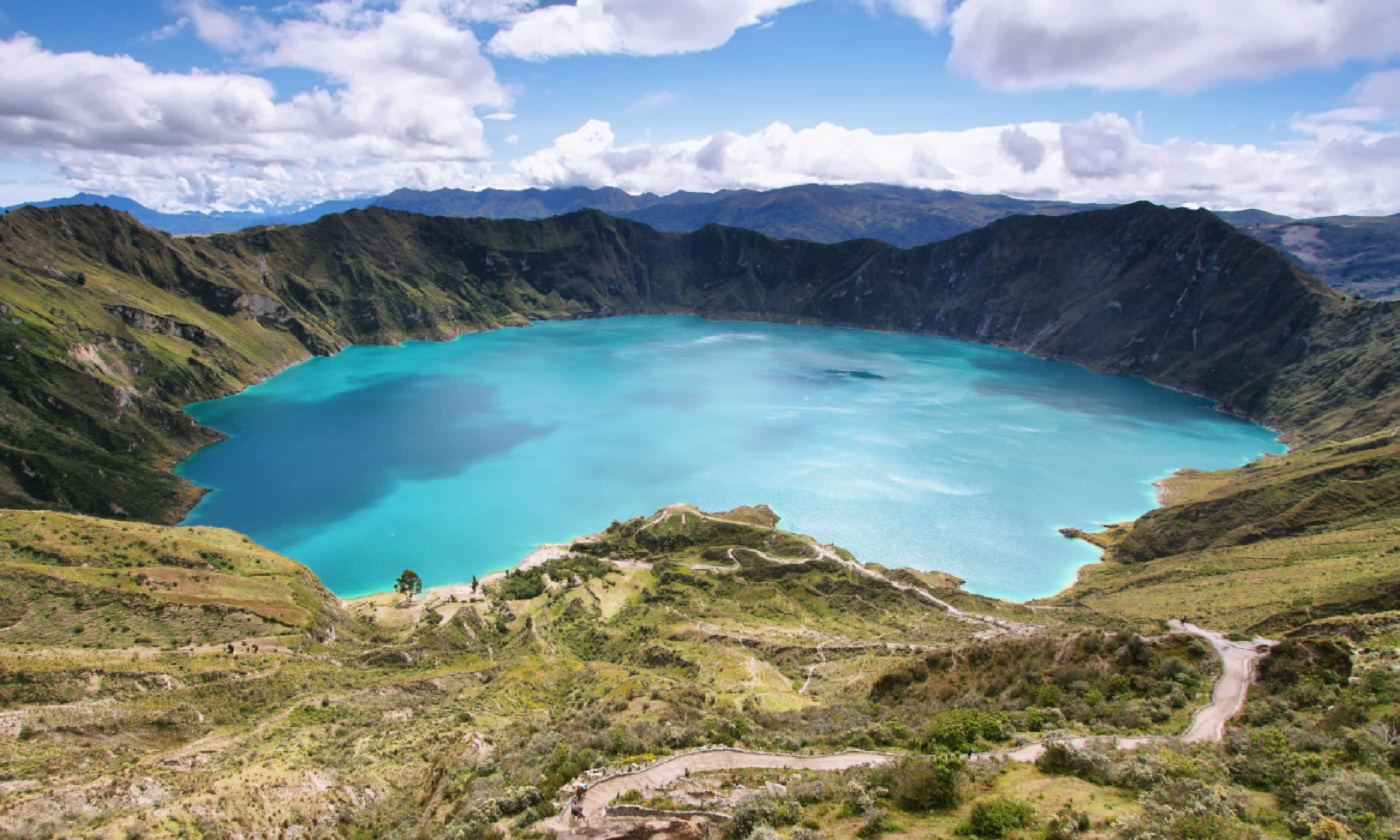 Quilotoa caldera
More info:
Quilotoa caldera
More info: Daily buses run from Latacunga (on the main Pan-American Highway) to Sigchos (2hrs) and Quilotoa (2hrs).
Like that? Try this... The 40km Inca Trail between Achupallas and Ingapirca reveals lesser-known pathways in central Ecuador.
Revisiting Quito, Ecuador | A trip to the birthplace of Wanderlust
Our guide to the best of Ecuador | One of South America's most dramatic countries
5. Paso de las Nubes, Argentina
Where? Parque Nacional Nahuel Huapi
Length: 23km
Days: 2-3
Difficulty: Easy-Moderate
A trek over the Pass of the Clouds packs a lot of punch into just 23km. From Pampa Linda, the route climbs through rich rainforest to the east of mighty 3,470m Monte Tronador – the highest summit in Nahuel Huapi NP, which guards the border between Argentina and Chile. After a night spent camping en route, a descent through Valdivian forest leads to the blue glitter of Laguna Frias, where you can board a boat back to civilisation.
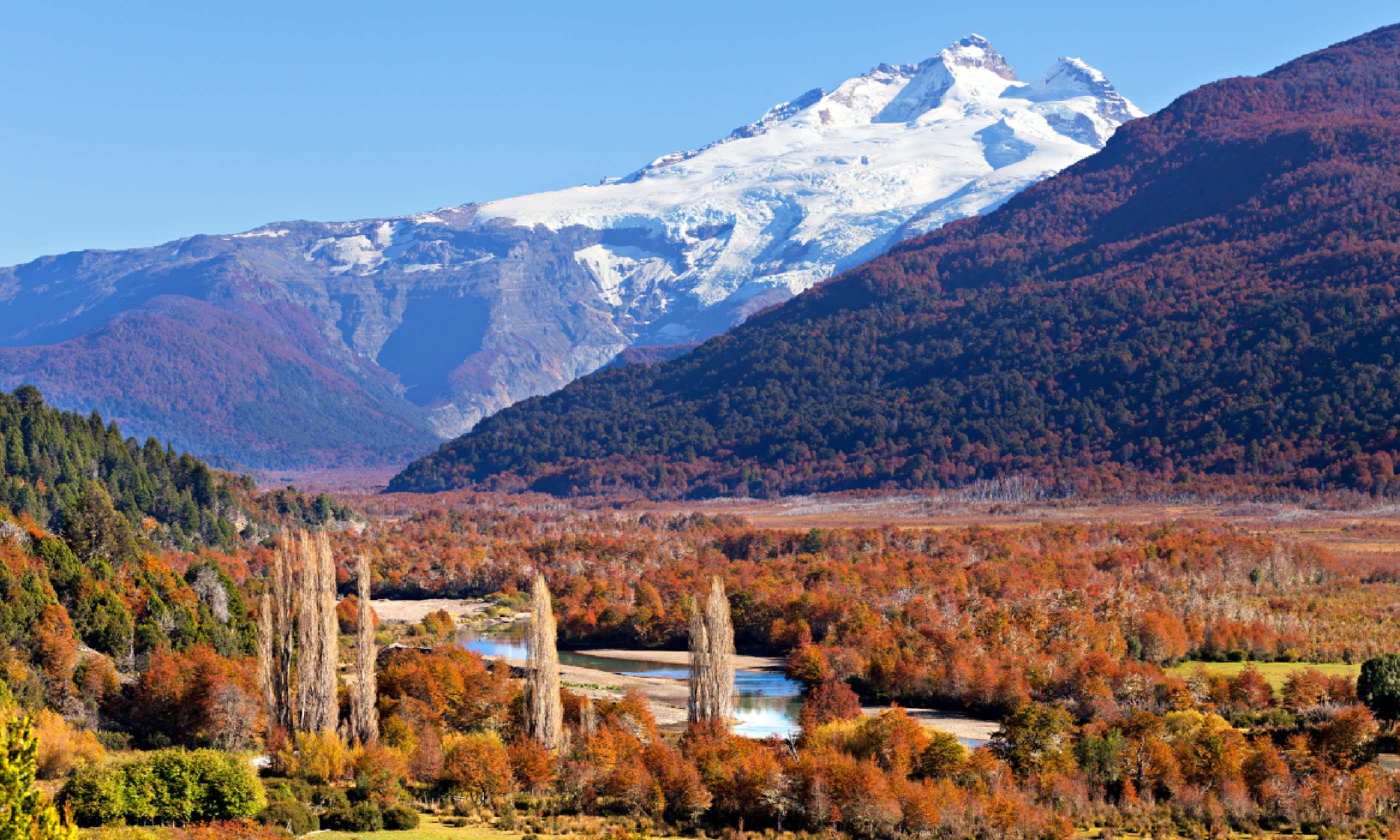 Tronador, Argentina (Shutterstock)
More info:
Tronador, Argentina (Shutterstock)
More info: Buses run Bariloche-Pampa Linda (1hr). Boats across Laguna Frias run to Puerto Blest, catch a bus back to Bariloche from there.
Like that? Try this... The full Nahuel Huapi Traverse (40km) is a tougher alternative, but showcases the full glory of the park.
Driving north-west Argentina | Driving the road to the clouds...
Argentina travel blueprint | How to plan the trip of a lifetime
6. Lost City Trek, Colombia
Where? Sierra Nevada
Length: 45km
Days: 5
Difficulty: Moderate; no altitude problems but humidity high
Over 600 years older and far, far less visited than the Lost City of Machu Picchu, Colombia’s Ciudad Perdida is like something out of Tomb Raider.
Squirreled away in the jungly Sierra Nevada, the settlement was built by the Tayrona people in AD 800; it was abandoned when the
conquistadores arrived and all but forgotten until the 1970s, when it was rediscovered by treasure hunters. Tourists followed, though a kidnapping in 2003 rendered the trek off-limits for a few years.
Today, though, it’s back on the map, so you can make the hot hike to the site via the Buritaca River, Kogi villages and coffee plantations, where 1,200 mossy steps lead to the cluster of houses, plazas, staircases, storehouses and canals perched 1,200m up in the mountains.
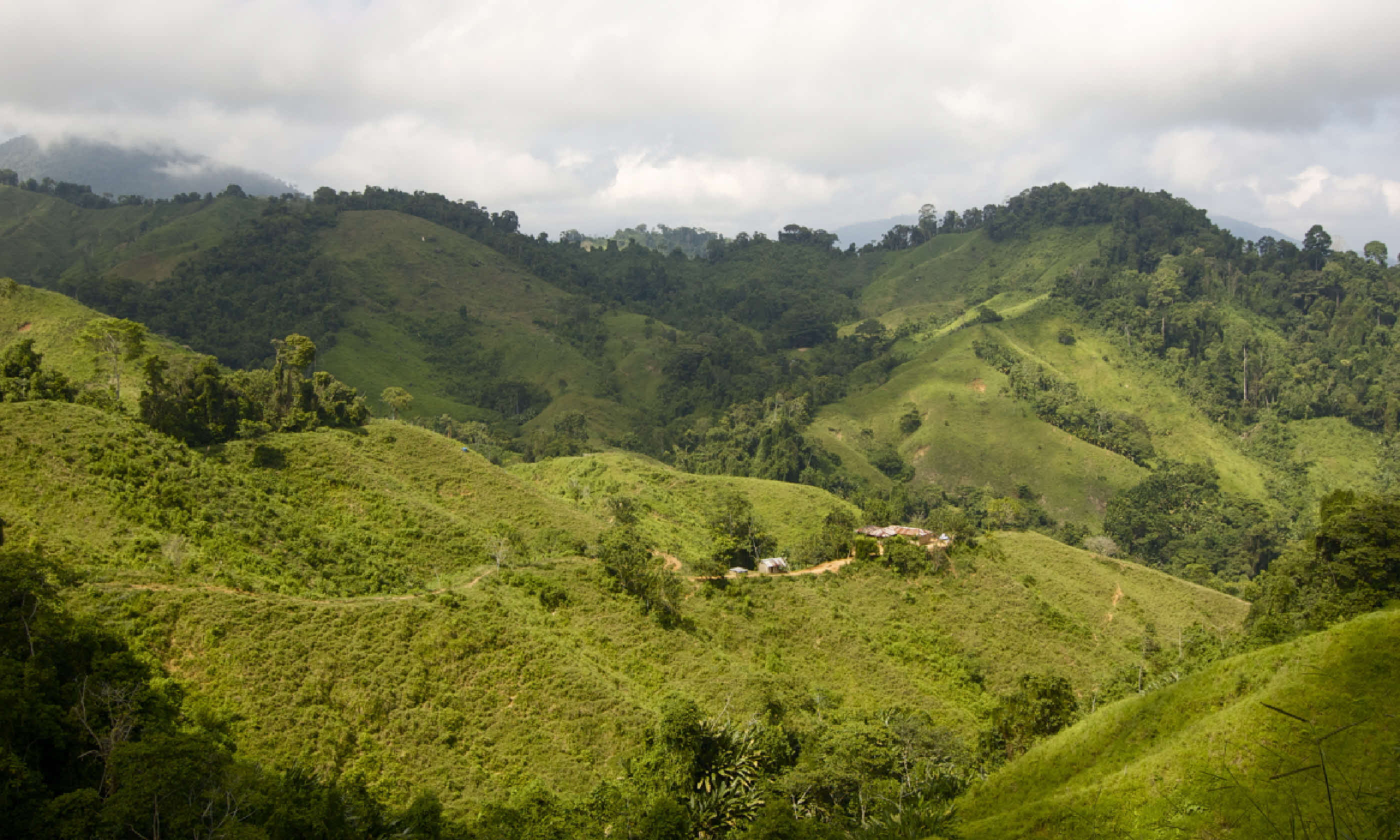 Trekking through the jungle in Colombia
More info:
Trekking through the jungle in Colombia
More info: Santa Marta, the main hub for trips into the Sierra Nevada, is served by buses from Bogotá (16hrs) and Cartagena (4hrs).
Like that? Try this... The half-day hike to the Pueblito ruins in Tayrona National Park offers a Lost City-like option for those with less time.
Coffee and culture in Colombia | Think verdant plantations and laid-back haciendas
The regeneration of Medellin, Colombia | Revisiting the infamous city of Medellin
7. Grand Circuit, Brazil
Where? Chapada Diamantina
Length: 100km
Days: 5-6
Difficulty: Moderate
Despite its size, Brazil isn’t big on trekking. But the country’s stand-out hike has to be the Grand Circuit of Lost World-like Chapada Diamantina National Park. Starting from Lençóis, the route loops up and down amid the distinctive table-top massifs, passing wide plateau, emerald valleys and dive-in-able pools.
Meet the hippy
alternativo residents of the Vale do Capão; admire 400m-high Cachoeira da Fumaça, one of the highest waterfalls in Brazil; detour to the stone ruins at Igatu; and keep a lookout for birds and orchids amid the foliage. Also, villages and
pousada accommodation en route mean you don’t have to spend every night under canvas.
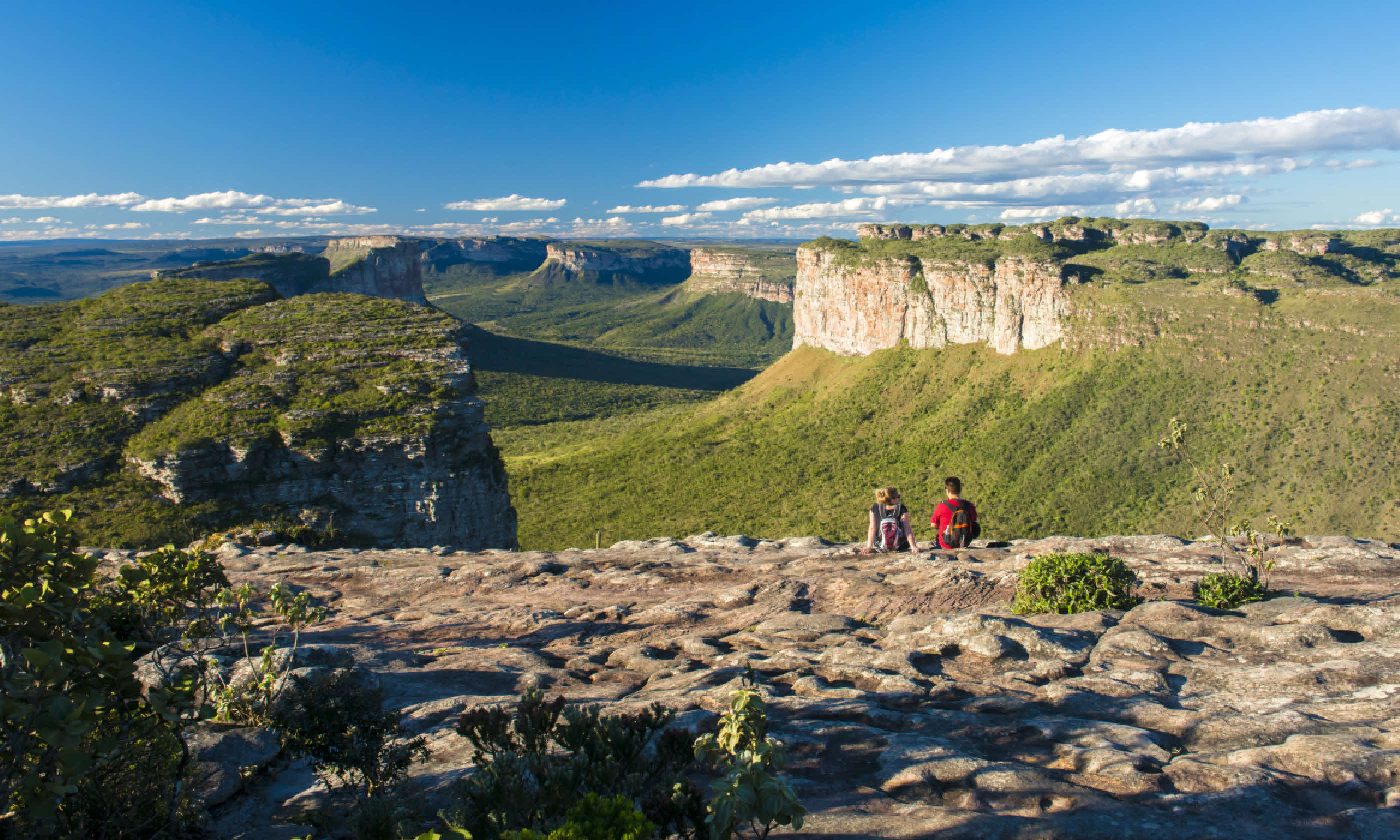 Chapada Diamantina National Park (Shutterstock)
More info:
Chapada Diamantina National Park (Shutterstock)
More info: Lençóis is 400km from Salvador; buses take around 6hrs.
Like that? Try this... Try a hike in Brazil’s Chapada dos Veadeiros NP – cascades, canyons and Indian communities but also fewer tourists.
Going off-grid in southern Bahia, Brazil | Discover Brazil's really wild side
Discover Brazil's dune coast | An unforgettable road trip
8. W Trek, Chile
Where? Torres del Paine
Length: 60km
Days: 5-7 days
Difficulty: Moderate; the weather can be bad
This is Patagonia’s most popular trek for a reason – it combines close-up views of those classic Cuernos(horns) with manageable walking between comfortable mountain huts. Though not as completist-satisfying as the longer Circuit Trek, the W sticks to the mountains’ south side – blessed with some of the best lookouts and, often, better weather.
Taking in the park’s three main valleys: the Ascensio, for those perfect granite-spire views; French Valley, where glaciers hang; and alongside Grey Lake, which leads up to the edge of the Patagonian Ice Cap. Also expect soaring condor, flamingos wading in the lagoons, and – maybe – the thrilling flash of puma.
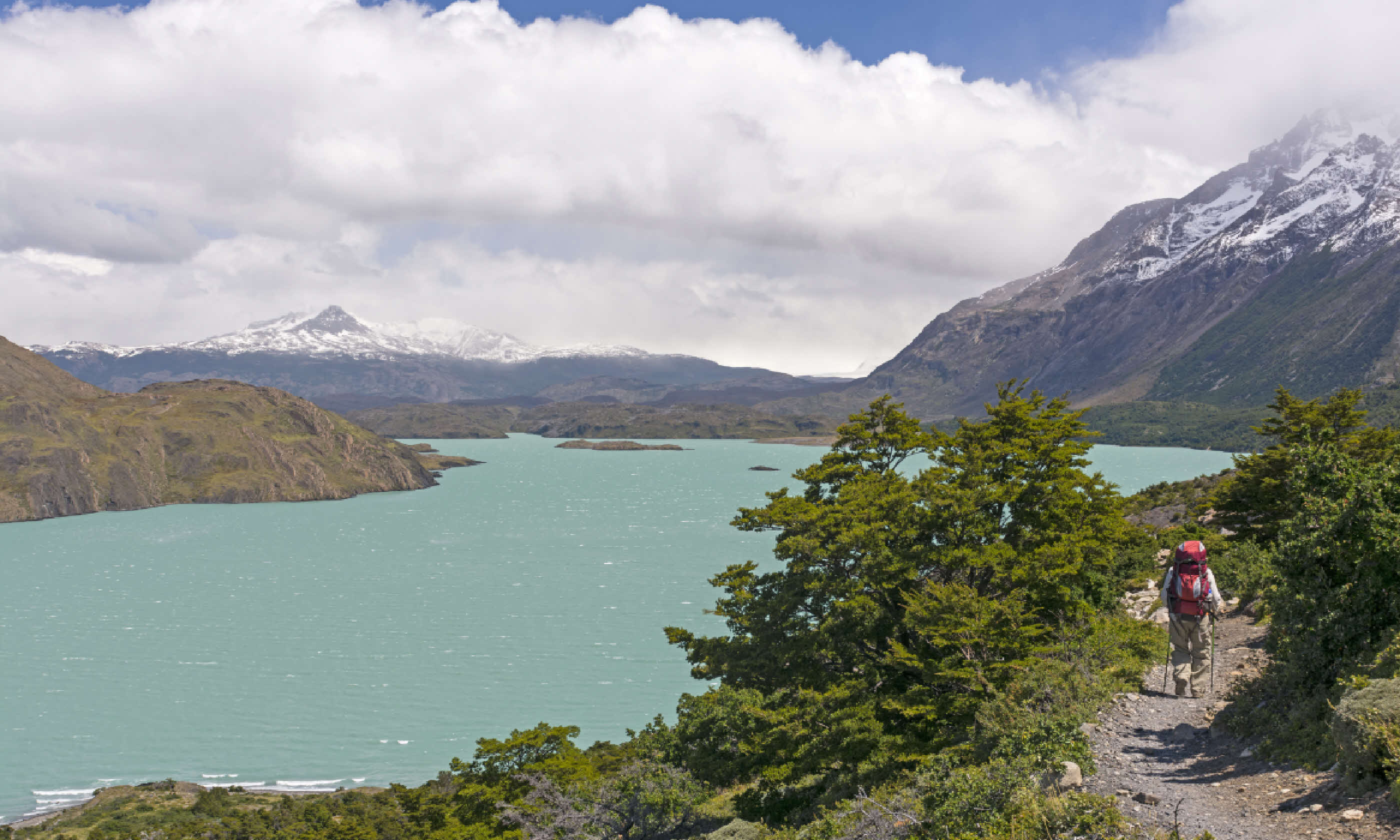 Lake Nordernskjold in Torres del Paine National Park
More info:
Lake Nordernskjold in Torres del Paine National Park
More info: Torres del Paine is 115km from Puerto Natales; the nearest airport is at Punta Arenas, 225km from Puerto Natales.
Like that? Try this... Got less time in Torres del Paine? Try the Lookout Trek (34km). Got more? Extend to the Circuit (130km).
10 roads you must ride in Chile and Argentina | Exploring incredible terrain
The Wanderlust guide to the best of Chile | How to plan your trip of a lifetime
9. El Misti, Peru
Where? Near Arequipa
Length: 25km
Days: 2-3 days
Difficulty: Moderate, if acclimatised
At 5,822m, El Misti is only about 80m short of Kilimanjaro but if it can’t claim to be the tallest on its continent, like the Tanzanian volcano, El Misti still offers non-climbers the chance to bag an impressive peak. The trek up El Misti, which looms over pretty Arequipa, is a slog-challenge rather than a technical prospect (though you might need an ice axe and crampons, depending on the season).
There are several routes up its slopes of lava and ash. Base camp teeters at 4,500m; from there it’s around a five-hour climb to the top, where you’ll find a 10m-tall iron cross and a sulfurous crater – El Misti is still active, last erupting in 1985. In 1998, six Inca mummies were found here – you can see them at Arequipa’s Museo de Santuarios Andinos.
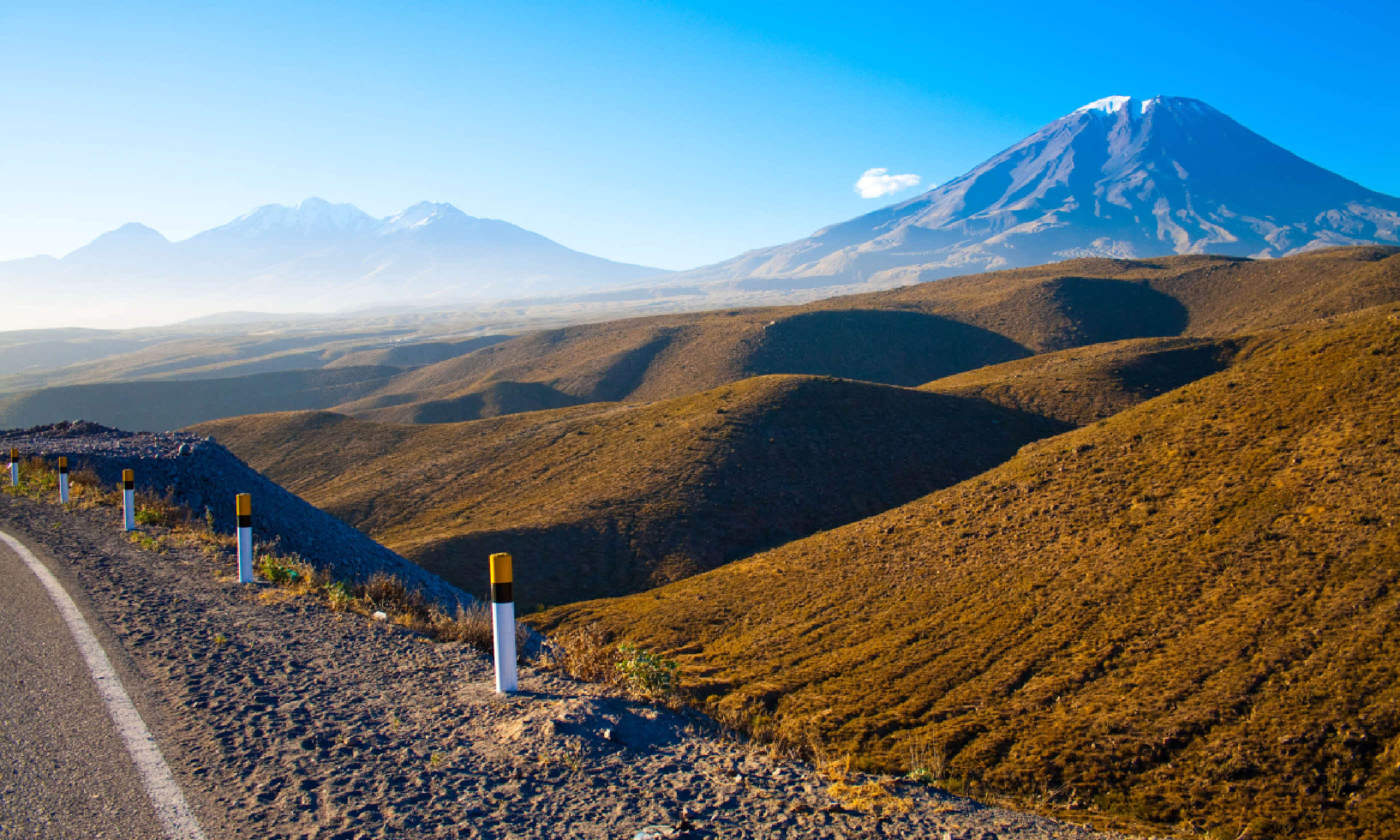 Volcano El Misti (Shutterstock)
More info:
Volcano El Misti (Shutterstock)
More info: Best to travel with a guide; tours can be arranged from nearby Arequipa. Chiguata, a popular trailhead, is a 45min drive from Arequipa.
Like that? Try this... Conquer Argentina’s 6,962m Aconcagua, South America’s highest.
Chile travel blueprint | Choose from 4 incredible itineraries
5 Chilean feasts for vegetarians | Quick, simple and easy veggie recipes
10. Condoriri Trek, Bolivia
Where? Cordillera Real
Length: 42km
Days: 4
Difficulty: Moderate-Tough
The Cordillera Real is a holy-moly mountain range: a gasp-inducing 120km-long swoop of glacier-cloaked granite peaks, eight of which soar over 6,000m. It’s utterly wild – yet sits within boot-throwing distance of capital, La Paz.
There are lots of fine hikes here, though many – largely on account of that extreme altitude – are tough. However, if you’ve already spent time acclimatising to breathy Bolivia, the Condoriri Trek, from Lake Tuni to Huayna Potosi, is an excellent option. The Condoriri is a varied mini-range within the cordillera, where you can hike amid mountains, hanging glaciers, grazing guanacos and sublime-blue lakes, making camp by the water’s edge.
The walking, on rough trails and sometimes snow, isn’t too challenging in itself but the passes – you’ll tackle one a day – are high indeed, topping 5,000m: it’s sure to test your lungs but also offer it-was-worth-it views.
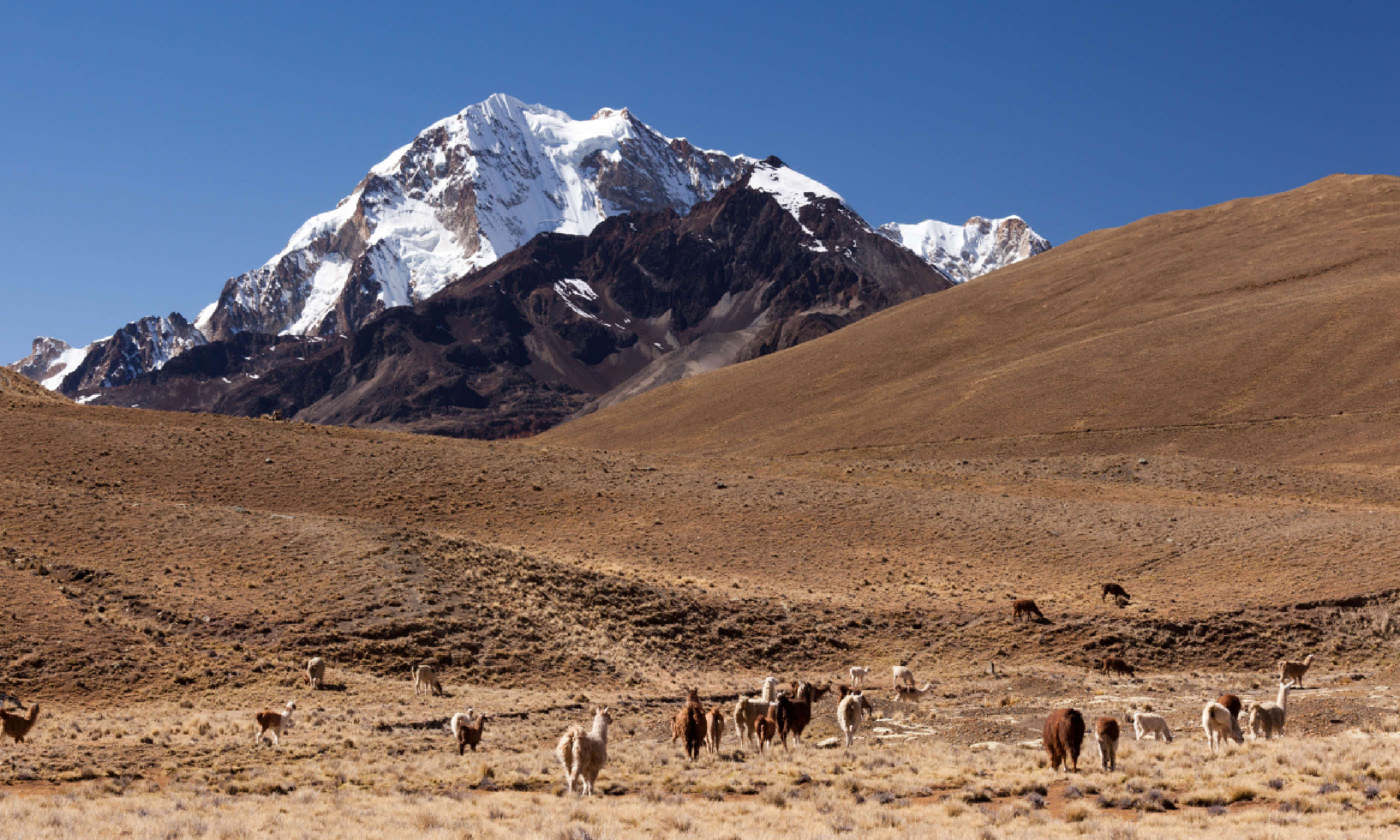 Condoriri Trek
More info:
Condoriri Trek
More info: Lake Tuni is about 60km north of La Paz. There is no public transport but, if you are not on a guided trek, reasonably priced private transport can be arranged via agencies in the capital.
Like that? Try this... Think you’re tough, and totally acclimatised? Then try the full Transcordillera, a 12-14 day arduously amazing challenge right across the Real.
Trekking in the Cordillera Blanca, Peru | Hilary Bradt shares her experiences
Know before you go: Bolivia | Read this before you travel...
11. Roraima, Venezuela
Where? Canaima National Park, Venezuela
Length: 95km
Days: 5-6
Difficulty: Moderate-Tough; the big battles are with conditions and flies
Hiking up 2,810m Mount Roraima, the most famous of the Gran Sabana’s 115
tepuis (table-top mountains), isn’t that hard. Or at least it wouldn’t be, were it not for the choking humidity, virtually daily downpours, slippery rocks and armies of jejenes, the insatiable biting sandflies that seem set on defending Roraima’s flanks. But battling such adversity is one of the strange draws of a hike here; it’s almost as if you have to prove your worth to be permitted access; only those who pass the tests get to enter the Lost World that is Roraima’s plateau-summit.
The atmosphere up here is eerie: it’s a place of crystal valleys, carnivorous plants, ghoulish rocks and weird frogs that have developed in virtual isolation from everything else around. It’s also a place where, if the tablecloth of cloud lifts, you can gaze out over Venezuela, Guyana and Brazil – Roraima marks the meeting point of the three countries.
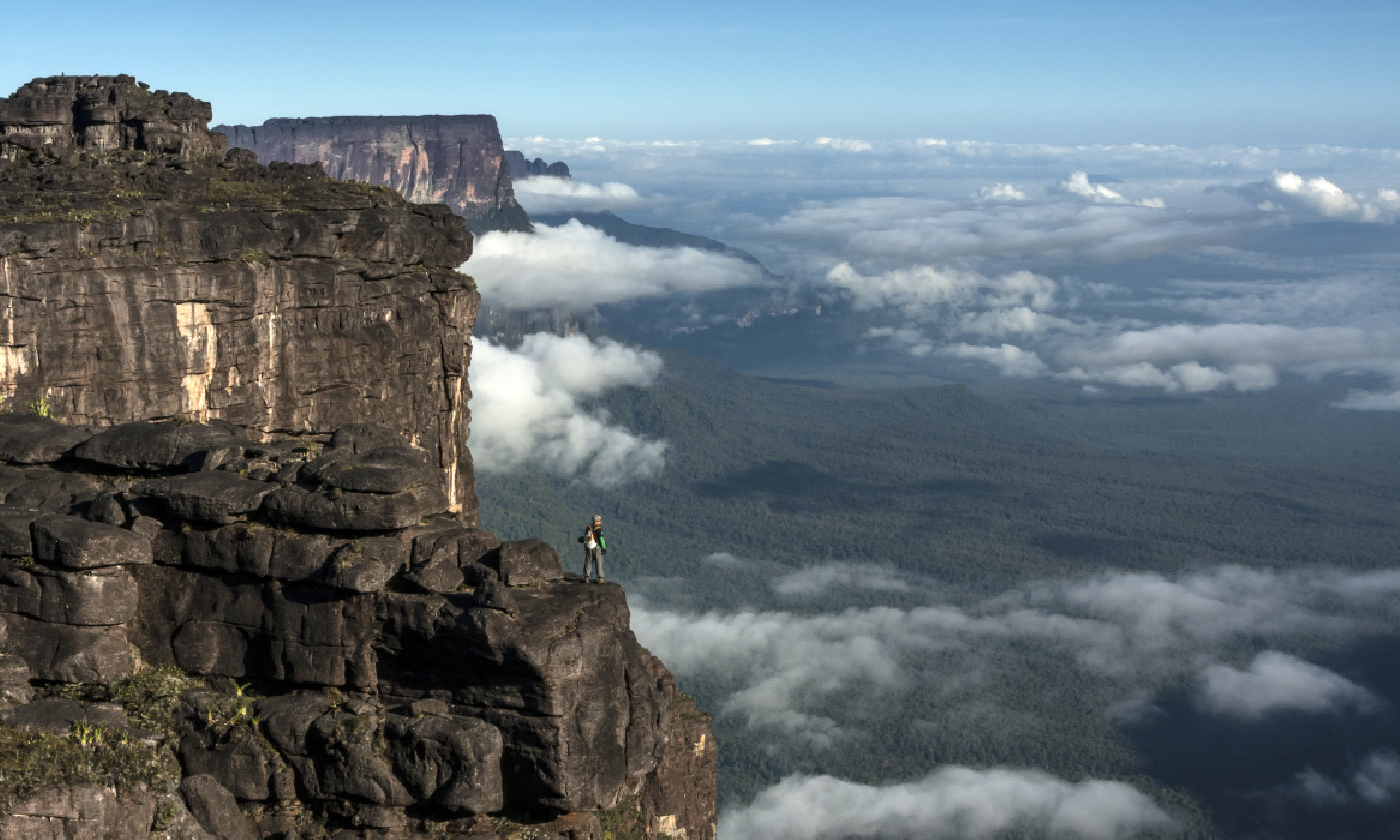 View from Roraima Tepui (Shutterstock)
More info:
View from Roraima Tepui (Shutterstock)
More info: The trailhead at Paraitepui is a 28km drive off the Trans Amazonian Highway at San Francisco de Yuruaní.
Like that? Try this... Try an alternative tepui: 2,450m Auyán-tepui is the largest in Canaima NP, with a vast summit plateau; also Angel Falls tumbles down its side.
Roraima: Venezuela's lost world | A landscape shrouded in mist and mystery
Venezuela travel guide | Plan your trip to this land of astonishing variety
12. Ausangate Circuit, Peru
Where? Cordillera Vilcanota
Length: 80km
Days: 5
Difficulty: Tough; very high altitudes
Imposing Ausangate (6,380m) is one of the highest peaks near Cusco, and perhaps the holiest: the local Andean people believe it is home to their gods. This trek does a circuit around it, offering up multicoloured lakes and views of mighty mountains with plenty of local culture: you’ll pass traditional villages (where you can dip in a hot spring) and gaggles of ladies wearing tasseled flatboard hats.
Best of all, it’s a trek of diversity, with varied hiking across
puna (high meadows), along valley floors, via blue-green lagoons and over lofty passes (some around 5,000m), where condors hover and fluffy viscachas scutter.
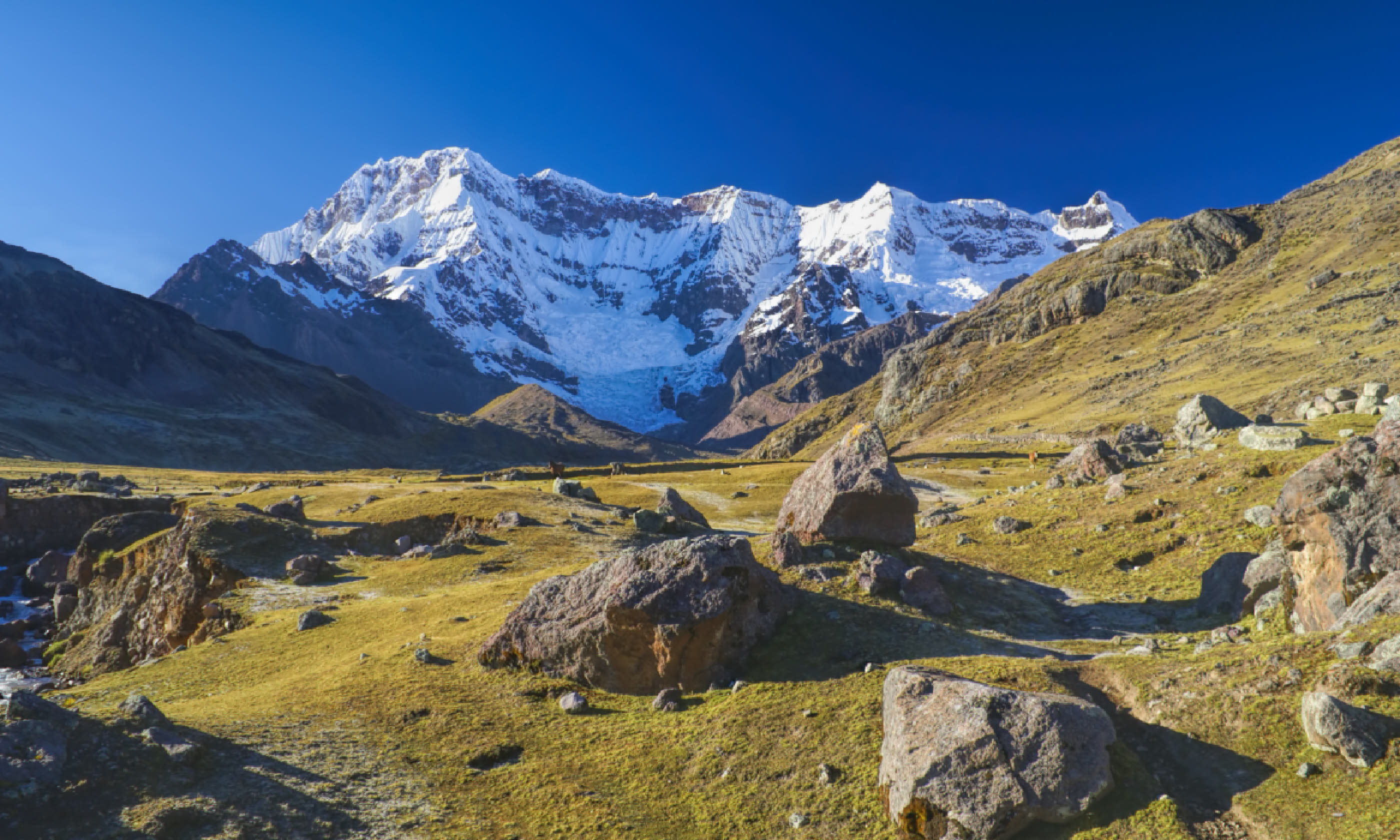 Peaks of Ausangate in Peru
More info:
Peaks of Ausangate in Peru
More info: The trek starts at Tinqui, around 80km east of Cusco. Buses from Cusco takes 6hrs.
Like that? Try this... If you’re avoiding the Inca Trail, but still want to hike to Machu Picchu, try hiking there via the impressive Choquequirao ruins or along the lesser-used Salkantay Trail.
Horse riding on the Salkantay Trek, Peru | Trot to the top of the alternative Inca Trail
Know before you go: Peru | First-time travellers' FAQs












